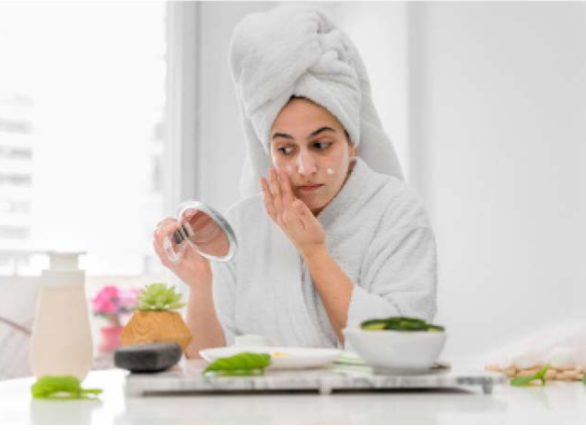Winter Skin Care

The skin type of every individual is determined by the number of sebaceous glands present in their skin. The distribution of oil glands is different in different areas. They are abundant on face, back and arms. These areas will turn less dry during winter. Areas where oil glands are less or absent can become very dry especially in winters. However, since the activity of sebaceous glands fluctuates with the seasons, skin type can vary throughout the year. For instance, skin that appears oily in one season may become completely dry in winter. As a result, products such as soap, powder, and moisturisers should be adjusted based on weather changes.
During cold months, we tend to sweat less, and the skin’s oil production decreases. At such times, the use of soap should be minimised. Soap should be used daily only on sweaty areas and parts of the body that are covered, while hands and feet can be washed with only water. The use of products like gram flour, or shikakai as alternatives to soap or excessive scrubbing with plastic scrub can worsen dryness. These homemade alternatives function as scrubs, and their abrasive nature removes the skin’s protective layer, making it more prone to infections and dryness. Moreover, exposure to sunlight can lead to problems as the skin lacks its natural barrier.
Some people prefer body washes over traditional soaps, while others use gentle scrubs. It’s important to note that body wash is essentially a type of soap, and there is no need to scrub the skin with abrasive materials. Our skin naturally sheds its outer layer every three weeks, revealing new skin beneath. This process happens subtly and isn’t visible to the naked eye, so there’s noneed to forcefully remove dead skin which in fact is a protective barrier for us
To alleviate the dryness caused by cold weather, applying oil or moisturiser within 10 minutes after bathing helps retain the water absorbed by the skin. It locks the moisture in the skin, keeping it soft. In our country, applying oil before bathing is a custom in many households. In fact, it can make the floor slippery and the oil often washes off during bathing, causing the skin to become dry again shortly after. Therefore, applying these products right after bathing is more effective. When selecting soap, opt for glycerine-based varieties, as medicated soaps tend to dry out the skin further despite offering the same cleaning effect. Additionally, avoid products with strong fragrances or artificial colours. Powder, which absorbs sweat, is unnecessary for non- sweaty skin during colder weather.
In winter, we typically wear warm clothes, but woollen garments can irritate the skin and exacerbate pre-existing skin conditions leading to aggravation in itching. To avoid this, wear cotton clothing underneath woollen garments or substitute woollen with thick cotton or flannel fabrics which are often more comfortable alternatives to wool.




